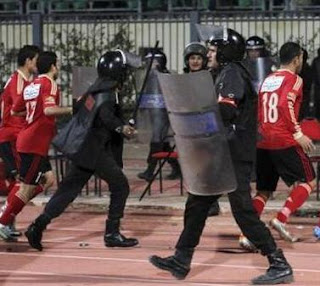 |
| In this Saturday, June 2, 2012 file photo, Egypt's ex-President Hosni Mubarak lays on a gurney inside a barred cage in the police academy courthouse in Cairo, Egypt. |
CAIRO (AP) -- Doctors used a defibrillator twice on Hosni Mubarak when they could not find a pulse Monday, the latest health crisis for the ousted Egyptian president since he was sentenced to life and moved to a prison hospital nine days ago, security officials said.
The officials said the 84-year-old Mubarak was slipping in and out of consciousness and was being fed liquids intravenously. Mubarak also lost consciousness several times Sunday and officials have said he is suffering from high blood pressure, depression and breathing difficulties.
Mubarak's health scare adds one more layer to Egypt's turbulent political scene with a runoff vote to choose his successor a few days away. His death would bring down the curtain on a chapter of Egypt's modern history that has divided this mainly Muslim nation of 85 million people.
His 29 years in power are the second longest by any Egyptian ruler since the 19th century, when the Ottoman general Mohammed Ali ruled the country for about 44 years ending with his death in 1849. While Mohammed Ali went down in history as the founder of modern Egypt, Mubarak's rule has been defined by corruption, police brutality and the behind-the-scenes rise to power by a coterie of regime-backed businessmen.
More than a year after a popular uprising swept him from office, Mubarak's legacy lives on. The last prime minister to serve under him will go head-to-head in the June 16-17 election against a candidate of the Muslim Brotherhood, the fundamentalist group that Mubarak spent most of his years in power cracking down on.
The candidacy of former Prime Minister Ahmed Shafiq, like Mubarak a career air force officer, is widely seen as an attempt by the old regime to hang on to power in the face of the revolutionary groups that engineered the uprising and the Brotherhood, whose candidate is U.S.-trained engineer Mohammed Morsi.
Mubarak has been held in the intensive care ward of Torah prison hospital south of Cairo since June 2, when he was convicted of failing to prevent the killing of protesters in the uprising that forced him from office in February 2011. He was sentenced to life in prison.
His two sons, onetime heir apparent Gamal and wealthy businessman Alaa, were at his side, the officials said on condition of anonymity because they were not authorized to speak to the media. The sons also are being held at the prison, awaiting trial on insider trading charges after they and their father were acquitted June 2 of corruption charges.
Mubarak's wife, Suzanne, visited him Sunday and, according to the officials, demanded that he be transferred to a better-equipped hospital outside the penal system. The officials said such a transfer was likely unless Mubarak's health improves.
In his last public appearance at his June 2 sentencing, the bedridden Mubarak sat stone-faced in the defendants' cage in the courtroom, his eyes hidden behind dark glasses. Officials said he broke into tears when he learned he was being transferred to a prison. It took officials hours to convince him to leave the helicopter that ferried him from the courthouse to the prison.
Media reports quoted Mubarak at the time as saying the military council who took over after his ouster had deceived him. "Egypt has sold me out. They want me to die here," he reportedly said.
News by AP
Read current news at http://bbc-cnn-worldnews.blogspot.com


